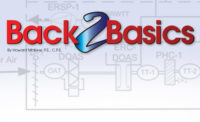The Gulf Coast is home to the largest refining center in the U.S. and accounts for more than one-quarter of crude oil production in the country. In fact, the 10 refineries in the Houston metro area process more than 2.6 million barrels of crude oil per calendar day — that’s more than 45% of the state’s total production and nearly 15% of the nation’s production. These refineries require superheated steam for process heating, electric power generation, and pumping.
One of the major refineries in the Gulf Coast region began executing its plan to expand in the fall of 2017, addressing the need for two 300,000 lbs./hr. superheat package watertube boilers. New boilers of this size typically require a minimum of one-and-a-half years from the date of order to producing steam when considering all tasks associated with the purchase, design, construction, installation, and startup of the new equipment. Faced with an immediate need for steam production, the customer contacted Nationwide Boiler to provide temporary equipment that would fill the void during this lengthy process. With multiple obstacles to overcome, Nationwide designed a solution to meet the customer’s operating parameters, installation restrictions, and swift operational timeline.
The first obstacle to address was the total steam capacity requirement of approximately 400,000 lbs./hr. With inventory and availability both a major factor in the delivery and timing of this project, Nationwide Boiler was able to reserve and prepare six 75,000 lbs./hr., 750 psig/750°F superheat, trailer-mounted, package, watertube, rental boilers to make up the total steam demand. Each of these rental boilers were mounted on a custom, highway-legal trailer with the ability to remove the gooseneck and running gear to accommodate space restrictions. And with plans to place six rental boilers in one general location with a small footprint, this was a key advantage when it came to preparing for the installation.

The next engineering challenge was to meet site requirements that dictated specific design and installation restrictions for the selective catalytic reduction (SCR) emissions control systems. The rental industry standard for SCR systems at the time included the use of anhydrous ammonia as the NOX reducing agent, with a structure to support the SCR equipment and a vertical design and flow configuration. The standard design, however, was not possible for this particular installation due to site-specific height restrictions and the avoidance of designing a new foundation that met structural wind-load conditions. And although the customer had anhydrous ammonia on-site for other processes, they preferred the use of an ammonia alternative as the NOX reducing agent.
To meet these various site-specific requisites, Nationwide Boiler’s engineering team produced the urea-based, horizontal flow, and ground-mounted design utilizing diesel exhaust fluid (DEF), a 32.5% liquid urea solution, as the reagent. Each system required roughly 12 pieces of ductwork that needed to be built, sandblasted, painted, and insulated. Extensive ammonia injection design and computational fluid dynamics (CFD) analysis for the most effective spray pattern were run in parallel with the design, construction, piping, and wiring of an additional six new urea supply skids. All equipment was quality-assurance (QA) checked and tested prior to shipment with delivery in an impressive 10 weeks’ time.
The biggest obstacle by far was meeting the stringent emissions requirements of the Texas Commission on Environmental Quality (TCEQ). Rental boilers of this size are typically designed with emission guarantees of 30 ppmvd NOX at 3% O2 and 50 parts per million by volume, dry (ppmvd) CO; however, the local mandate for these temporary boilers was to meet 9 ppm NOX at 3% O2 and 10 ppm ammonia (NH3) slip. Nationwide Boiler’s extensive ultra-low NOx experience in the supply and operation of SCR systems for large package boilers in California provided the company with the proven experience and the ability to meet these strict emission standards. After all equipment was installed, commissioned, and source-tested, the average performance for all six units throughout the duration of the rental was 6 ppmvd NOX at 3% O2, 7 ppmvd NH3 slip, and up to 25 ppmvd CO.

Finally, to address the significant customer request to maintain high availability and reliable operation of all equipment, Nationwide Boiler also supplied 24/7 boiler operators for maintenance and operation of the temporary steam plant. Because the customer did not have the capacity in terms of personnel to operate the temporary equipment, this was a major advantage in the overall success of the project. Having operators on-site expedited maintaining up-time, quick restarts, and immediate troubleshooting when issues arose. The operators were tasked with routine maintenance to prevent unexpected trips, and when an inadvertent shutdown occurred, the operators were able to assess, correct, and return steam to the header in the quickest time possible. The project team created a fault analysis during the planning phase, which also allowed operators to prevent and avoid spurious trips.
The temporary boiler equipment supplied process steam to meet facility demand for more than three years and was also instrumental in returning this facility to an operable state after the “Big Texas Freeze of 2021.” With local support for instruments and other parts that froze, Nationwide Boiler was able to get all rental equipment back up and running within four days of the initial shutdown, allowing the temporary boilers to be utilized to startup the rest of the plant. In fact, this facility was one of the first to be back up and running on the ship channel — a major feat in a time of uncertainty.
Overall, Nationwide Boiler provided an immense amount of engineering, equipment, parts, and operational support to satisfy project requirements and meet a short schedule in terms of the temporary equipment delivery and steam plant production. Furthermore, the success of this project yielded another first for the rental industry with urea-based rental SCR systems and facilitated the construction of an entire fleet of these units that are now available from Nationwide Boiler Inc. Since this major refinery expansion project, Nationwide Boiler has managed various other urea-based SCR rentals in multiple configurations throughout the Gulf Coast and beyond.
While major projects like this bring challenges and obstacles to overcome, they also bring the opportunity for new innovations and creative solutions that can continue to be built upon and utilized for future projects throughout the industry.




